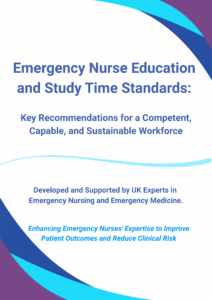
FEN is proud to share this landmark recommendation paper: the first set of Emergency Nurse Education and Study Time Standards (ENESTS) for the UK. Developed by experts in Emergency Nursing and Emergency Medicine from NHS Trusts, Health Boards, and professional organisations, this paper sets out a clear, sustainable strategy for the future of Emergency Nursing.
At its heart is a simple but vital principle: protected education time. Combined with defined career pathways and equitable access to Clinical Nurse Educators, these proposals aim to reduce variation, improve retention, and strengthen care quality across the NHS.
Aligned with national priorities, the paper has been submitted to Government ministers, nursing leaders, and education bodies.
Why This Matters
Emergency Nurses work in one of the NHS’s most demanding clinical settings. Without access to structured learning and dedicated support, staff risk falling behind in essential skills — contributing to burnout, attrition, and variation in care quality.
By embedding National Standards for Education and Study Time, the NHS can build a more resilient workforce, retain skilled nurses, and ensure patients consistently receive safe, effective care.
Key Recommendations

75 hours for ongoing development and preparation
225 hours for those undertaking formal progression
330 hours (SPA) + 75 hours study leave for those in or training for autonomous roles
(Additional time may be required for university programmes or those using the apprentice levy.)




The Impact
These proposals set out how to equip, support, and retain Emergency Nurses for the long term. By establishing Emergency Nurse Education and Study Time Standards, the NHS can:
Strengthen workforce resilience and retention
Ensure safe, high-quality emergency care for patients
Create clear, equitable pathways for professional growth
Deliver a sustainable education strategy aligned to national priorities

